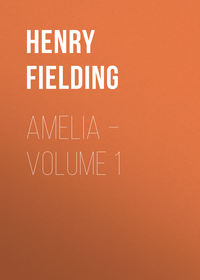 полная версия
полная версияHistory of Tom Jones, a Foundling
Having ended his rage against the captain, with swearing he would take the law of him, the squire now mounted upstairs to Sophia, whom, as soon as he had unlocked and opened the door, he found all pale and breathless. The moment, however, that she saw her father, she collected all her spirits, and, catching him hold by the hand, she cryed passionately, “O my dear sir, I am almost frightened to death! I hope to heaven no harm hath happened to you.” “No, no,” cries the squire, “no great harm. The rascal hath not hurt me much, but rat me if I don’t ha the la o’ un.” “Pray, dear sir,” says she, “tell me what’s the matter; who is it that hath insulted you?” “I don’t know the name o’ un,” answered Western; “some officer fellow, I suppose, that we are to pay for beating us; but I’ll make him pay this bout, if the rascal hath got anything, which I suppose he hath not. For thof he was drest out so vine, I question whether he had got a voot of land in the world.” “But, dear sir,” cries she, “what was the occasion of your quarrel?” “What should it be, Sophy,” answered the squire, “but about you, Sophy? All my misfortunes are about you; you will be the death of your poor father at last. Here’s a varlet of a lord, the Lord knows who, forsooth! who hath a taan a liking to you, and because I would not gi un my consent, he sent me a kallenge. Come, do be a good girl, Sophy, and put an end to all your father’s troubles; come, do consent to ha un; he will be in town within this day or two; do but promise me to marry un as soon as he comes, and you will make me the happiest man in the world, and I will make you the happiest woman; you shall have the finest cloaths in London, and the finest jewels, and a coach and six at your command. I promised Allworthy already to give up half my estate – od rabbet it! I should hardly stick at giving up the whole.” “Will my papa be so kind,” says she, “as to hear me speak?” – “Why wout ask, Sophy?” cries he, “when dost know I had rather hear thy voice than the musick of the best pack of dogs in England. – Hear thee, my dear little girl! I hope I shall hear thee as long as I live; for if I was ever to lose that pleasure, I would not gee a brass varden to live a moment longer. Indeed, Sophy, you do not know how I love you, indeed you don’t, or you never could have run away and left your poor father, who hath no other joy, no other comfort upon earth, but his little Sophy.” At these words the tears stood in his eyes; and Sophia (with the tears streaming from hers) answered, “Indeed, my dear papa, I know you have loved me tenderly, and heaven is my witness how sincerely I have returned your affection; nor could anything but an apprehension of being forced into the arms of this man have driven me to run from a father whom I love so passionately, that I would, with pleasure, sacrifice my life to his happiness; nay, I have endeavoured to reason myself into doing more, and had almost worked up a resolution to endure the most miserable of all lives, to comply with your inclination. It was that resolution alone to which I could not force my mind; nor can I ever.” Here the squire began to look wild, and the foam appeared at his lips, which Sophia, observing, begged to be heard out, and then proceeded: “If my father’s life, his health, or any real happiness of his was at stake, here stands your resolved daughter; may heaven blast me if there is a misery I would not suffer to preserve you! – No, that most detested, most loathsome of all lots would I embrace. I would give my hand to Blifil for your sake.” – “I tell thee, it will preserve me,” answers the father; “it will give me health, happiness, life, everything. – Upon my soul I shall die if dost refuse me; I shall break my heart, I shall, upon my soul.” – “Is it possible,” says she, “you can have such a desire to make me miserable?” – “I tell thee noa,” answered he loudly, “d – n me if there is a thing upon earth I would not do to see thee happy.” – “And will not my dear papa allow me to have the least knowledge of what will make me so? If it be true that happiness consists in opinion, what must be my condition, when I shall think myself the most miserable of all the wretches upon earth?” “Better think yourself so,” said he, “than know it by being married to a poor bastardly vagabond.” “If it will content you, sir,” said Sophia, “I will give you the most solemn promise never to marry him, nor any other, while my papa lives, without his consent. Let me dedicate my whole life to your service; let me be again your poor Sophy, and my whole business and pleasure be, as it hath been, to please and divert you.” “Lookee, Sophy,” answered the squire, “I am not to be choused in this manner. Your aunt Western would then have reason to think me the fool she doth. No, no, Sophy, I’d have you to know I have a got more wisdom, and know more of the world, than to take the word of a woman in a matter where a man is concerned.” “How, sir, have I deserved this want of confidence?” said she; “have I ever broke a single promise to you? or have I ever been found guilty of a falsehood from my cradle?” “Lookee, Sophy,” cries he; “that’s neither here nor there. I am determined upon this match, and have him you shall, d – n me if shat unt. D – n me if shat unt, though dost hang thyself the next morning.” At repeating which words he clinched his fist, knit his brows, bit his lips, and thundered so loud, that the poor afflicted, terrified Sophia sunk trembling into her chair, and, had not a flood of tears come immediately to her relief, perhaps worse had followed.
Western beheld the deplorable condition of his daughter with no more contrition or remorse than the turnkey of Newgate feels at viewing the agonies of a tender wife, when taking her last farewel of her condemned husband; or rather he looked down on her with the same emotions which arise in an honest fair tradesman, who sees his debtor dragged to prison for £10, which, though a just debt, the wretch is wickedly unable to pay. Or, to hit the case still more nearly, he felt the same compunction with a bawd, when some poor innocent, whom she hath ensnared into her hands, falls into fits at the first proposal of what is called seeing company. Indeed this resemblance would be exact, was it not that the bawd hath an interest in what she doth, and the father, though perhaps he may blindly think otherwise, can, in reality, have none in urging his daughter to almost an equal prostitution.
In this condition he left his poor Sophia, and, departing with a very vulgar observation on the effect of tears, he locked the room, and returned to the parson, who said everything he durst in behalf of the young lady, which, though perhaps it was not quite so much as his duty required, yet was it sufficient to throw the squire into a violent rage, and into many indecent reflections on the whole body of the clergy, which we have too great an honour for that sacred function to commit to paper.
Chapter iii. – What happened to Sophia during her confinement
The landlady of the house where the squire lodged had begun very early to entertain a strange opinion of her guests. However, as she was informed that the squire was a man of vast fortune, and as she had taken care to exact a very extraordinary price for her rooms, she did not think proper to give any offence; for, though she was not without some concern for the confinement of poor Sophia, of whose great sweetness of temper and affability the maid of the house had made so favourable a report, which was confirmed by all the squire’s servants, yet she had much more concern for her own interest than to provoke one, whom, as she said, she perceived to be a very hastish kind of a gentleman.
Though Sophia eat but little, yet she was regularly served with her meals; indeed, I believe, if she had liked any one rarity, that the squire, however angry, would have spared neither pains nor cost to have procured it for her; since, however strange it may appear to some of my readers, he really doated on his daughter, and to give her any kind of pleasure was the highest satisfaction of his life.
The dinner-hour being arrived, Black George carried her up a pullet, the squire himself (for he had sworn not to part with the key) attending the door. As George deposited the dish, some compliments passed between him and Sophia (for he had not seen her since she left the country, and she treated every servant with more respect than some persons shew to those who are in a very slight degree their inferiors). Sophia would have had him take the pullet back, saying, she could not eat; but George begged her to try, and particularly recommended to her the eggs, of which he said it was full.
All this time the squire was waiting at the door; but George was a great favourite with his master, as his employment was in concerns of the highest nature, namely, about the game, and was accustomed to take many liberties. He had officiously carried up the dinner, being, as he said, very desirous to see his young lady; he made therefore no scruple of keeping his master standing above ten minutes, while civilities were passing between him and Sophia, for which he received only a good-humoured rebuke at the door when he returned.
The eggs of pullets, partridges, pheasants, &c., were, as George well knew, the most favourite dainties of Sophia. It was therefore no wonder that he, who was a very good-natured fellow, should take care to supply her with this kind of delicacy, at a time when all the servants in the house were afraid she would be starved; for she had scarce swallowed a single morsel in the last forty hours.
Though vexation hath not the same effect on all persons as it usually hath on a widow, whose appetite it often renders sharper than it can be rendered by the air on Bansted Downs, or Salisbury Plain; yet the sublimest grief, notwithstanding what some people may say to the contrary, will eat at last. And Sophia, herself, after some little consideration, began to dissect the fowl, which she found to be as full of eggs as George had reported it.
But, if she was pleased with these, it contained something which would have delighted the Royal Society much more; for if a fowl with three legs be so invaluable a curiosity, when perhaps time hath produced a thousand such, at what price shall we esteem a bird which so totally contradicts all the laws of animal oeconomy, as to contain a letter in its belly? Ovid tells us of a flower into which Hyacinthus was metamorphosed, that bears letters on its leaves, which Virgil recommended as a miracle to the Royal Society of his day; but no age nor nation hath ever recorded a bird with a letter in its maw.
But though a miracle of this kind might have engaged all the Académies des Sciences in Europe, and perhaps in a fruitless enquiry; yet the reader, by barely recollecting the last dialogue which passed between Messieurs Jones and Partridge, will be very easily satisfied from whence this letter came, and how it found its passage into the fowl.
Sophia, notwithstanding her long fast, and notwithstanding her favourite dish was there before her, no sooner saw the letter than she immediately snatched it up, tore it open, and read as follows: —
“MADAM,
“Was I not sensible to whom I have the honour of writing, I should endeavour, however difficult, to paint the horrors of my mind at the account brought me by Mrs Honour; but as tenderness alone can have any true idea of the pangs which tenderness is capable of feeling, so can this most amiable quality, which my Sophia possesses in the most eminent degree, sufficiently inform her what her Jones must have suffered on this melancholy occasion. Is there a circumstance in the world which can heighten my agonies, when I hear of any misfortune which hath befallen you? Surely there is one only, and with that I am accursed. It is, my Sophia, the dreadful consideration that I am myself the wretched cause. Perhaps I here do myself too much honour, but none will envy me an honour which costs me so extremely dear. Pardon me this presumption, and pardon me a greater still, if I ask you, whether my advice, my assistance, my presence, my absence, my death, or my tortures can bring you any relief? Can the most perfect admiration, the most watchful observance, the most ardent love, the most melting tenderness, the most resigned submission to your will, make you amends for what you are to sacrifice to my happiness? If they can, fly, my lovely angel, to those arms which are ever open to receive and protect you; and to which, whether you bring yourself alone, or the riches of the world with you, is, in my opinion, an alternative not worth regarding. If, on the contrary, wisdom shall predominate, and, on the most mature reflection, inform you, that the sacrifice is too great; and if there be no way left to reconcile your father, and restore the peace of your dear mind, but by abandoning me, I conjure you drive me for ever from your thoughts, exert your resolution, and let no compassion for my sufferings bear the least weight in that tender bosom. Believe me, madam, I so sincerely love you better than myself, that my great and principal end is your happiness. My first wish (why would not fortune indulge me in it?) was, and pardon me if I say, still is, to see you every moment the happiest of women; my second wish is, to hear you are so; but no misery on earth can equal mine, while I think you owe an uneasy moment to him who is,
Madam, in every sense, and to every purpose,your devoted,THOMAS JONES.”What Sophia said, or did, or thought, upon this letter, how often she read it, or whether more than once, shall all be left to our reader’s imagination. The answer to it he may perhaps see hereafter, but not at present: for this reason, among others, that she did not now write any, and that for several good causes, one of which was this, she had no paper, pen, nor ink.
In the evening, while Sophia was meditating on the letter she had received, or on something else, a violent noise from below disturbed her meditations. This noise was no other than a round bout at altercation between two persons. One of the combatants, by his voice, she immediately distinguished to be her father; but she did not so soon discover the shriller pipes to belong to the organ of her aunt Western, who was just arrived in town, where having, by means of one of her servants, who stopt at the Hercules Pillars, learned where her brother lodged, she drove directly to his lodgings.
We shall therefore take our leave at present of Sophia, and, with our usual good-breeding, attend her ladyship.
Chapter iv. – In which Sophia is delivered from her confinement
The squire and the parson (for the landlord was now otherwise engaged) were smoaking their pipes together, when the arrival of the lady was first signified. The squire no sooner heard her name, than he immediately ran down to usher her upstairs; for he was a great observer of such ceremonials, especially to his sister, of whom he stood more in awe than of any other human creature, though he never would own this, nor did he perhaps know it himself.
Mrs Western, on her arrival in the dining-room, having flung herself into a chair, began thus to harangue: “Well, surely, no one ever had such an intolerable journey. I think the roads, since so many turnpike acts, are grown worse than ever. La, brother, how could you get into this odious place? no person of condition, I dare swear, ever set foot here before.” “I don’t know,” cries the squire, “I think they do well enough; it was landlord recommended them. I thought, as he knew most of the quality, he could best shew me where to get among um.” “Well, and where’s my niece?” says the lady; “have you been to wait upon Lady Bellaston yet?” “Ay, ay,” cries the squire, “your niece is safe enough; she is upstairs in chamber.” “How!” answered the lady, “is my niece in this house, and does she not know of my being here?” “No, nobody can well get to her,” says the squire, “for she is under lock and key. I have her safe; I vetched her from my lady cousin the first night I came to town, and I have taken care o’ her ever since; she is as secure as a fox in a bag, I promise you.” “Good heaven!” returned Mrs Western, “what do I hear? I thought what a fine piece of work would be the consequence of my consent to your coming to town yourself; nay, it was indeed your own headstrong will, nor can I charge myself with having ever consented to it. Did not you promise me, brother, that you would take none of these headstrong measures? Was it not by these headstrong measures that you forced my niece to run away from you in the country? Have you a mind to oblige her to take such another step?” “Z – ds and the devil!” cries the squire, dashing his pipe on the ground; “did ever mortal hear the like? when I expected you would have commended me for all I have done, to be fallen upon in this manner!” “How, brother!” said the lady, “have I ever given you the least reason to imagine I should commend you for locking up your daughter? Have I not often told you that women in a free country are not to be treated with such arbitrary power? We are as free as the men, and I heartily wish I could not say we deserve that freedom better. If you expect I should stay a moment longer in this wretched house, or that I should ever own you again as my relation, or that I should ever trouble myself again with the affairs of your family, I insist upon it that my niece be set at liberty this instant.” This she spoke with so commanding an air, standing with her back to the fire, with one hand behind her, and a pinch of snuff in the other, that I question whether Thalestris, at the head of her Amazons, ever made a more tremendous figure. It is no wonder, therefore, that the poor squire was not proof against the awe which she inspired. “There,” he cried, throwing down the key, “there it is, do whatever you please. I intended only to have kept her up till Blifil came to town, which can’t be long; and now if any harm happens in the mean time, remember who is to be blamed for it.”
“I will answer it with my life,” cried Mrs Western, “but I shall not intermeddle at all, unless upon one condition, and that is, that you will commit the whole entirely to my care, without taking any one measure yourself, unless I shall eventually appoint you to act. If you ratify these preliminaries, brother, I yet will endeavour to preserve the honour of your family; if not, I shall continue in a neutral state.”
“I pray you, good sir,” said the parson, “permit yourself this once to be admonished by her ladyship: peradventure, by communing with young Madam Sophia, she will effect more than you have been able to perpetrate by more rigorous measures.”
“What, dost thee open upon me?” cries the squire: “if thee dost begin to babble, I shall whip thee in presently.”
“Fie, brother,” answered the lady, “is this language to a clergyman? Mr Supple is a man of sense, and gives you the best advice; and the whole world, I believe, will concur in his opinion; but I must tell you I expect an immediate answer to my categorical proposals. Either cede your daughter to my disposal, or take her wholly to your own surprizing discretion, and then I here, before Mr Supple, evacuate the garrison, and renounce you and your family for ever.”
“I pray you let me be a mediator,” cries the parson, “let me supplicate you.”
“Why, there lies the key on the table,” cries the squire. “She may take un up, if she pleases: who hinders her?”
“No, brother,” answered the lady, “I insist on the formality of its being delivered me, with a full ratification of all the concessions stipulated.”
“Why then I will deliver it to you. – There ‘tis,” cries the squire. “I am sure, sister, you can’t accuse me of ever denying to trust my daughter to you. She hath a-lived wi’ you a whole year and muore to a time, without my ever zeeing her.”
“And it would have been happy for her,” answered the lady, “if she had always lived with me. Nothing of this kind would have happened under my eye.”
“Ay, certainly,” cries he, “I only am to blame.”
“Why, you are to blame, brother,” answered she. “I have been often obliged to tell you so, and shall always be obliged to tell you so. However, I hope you will now amend, and gather so much experience from past errors, as not to defeat my wisest machinations by your blunders. Indeed, brother, you are not qualified for these negociations. All your whole scheme of politics is wrong. I once more, therefore, insist, that you do not intermeddle. Remember only what is past.” —
“Z – ds and bl – d, sister,” cries the squire, “what would you have me say? You are enough to provoke the devil.”
“There, now,” said she, “just according to the old custom. I see, brother, there is no talking to you. I will appeal to Mr Supple, who is a man of sense, if I said anything which could put any human creature into a passion; but you are so wrongheaded every way.”
“Let me beg you, madam,” said the parson, “not to irritate his worship.”
“Irritate him?” said the lady; “sure, you are as great a fool as himself. Well, brother, since you have promised not to interfere, I will once more undertake the management of my niece. Lord have mercy upon all affairs which are under the directions of men! The head of one woman is worth a thousand of yours.” And now having summoned a servant to show her to Sophia, she departed, bearing the key with her.
She was no sooner gone, than the squire (having first shut the door) ejaculated twenty bitches, and as many hearty curses against her, not sparing himself for having ever thought of her estate; but added, “Now one hath been a slave so long, it would be pity to lose it at last, for want of holding out a little longer. The bitch can’t live for ever, and I know I am down for it upon the will.”
The parson greatly commended this resolution: and now the squire having ordered in another bottle, which was his usual method when anything either pleased or vexed him, did, by drinking plentifully of this medicinal julap, so totally wash away his choler, that his temper was become perfectly placid and serene, when Mrs Western returned with Sophia into the room. The young lady had on her hat and capuchin, and the aunt acquainted Mr Western, “that she intended to take her niece with her to her own lodgings; for, indeed, brother,” says she, “these rooms are not fit to receive a Christian soul in.”
“Very well, madam,” quoth Western, “whatever you please. The girl can never be in better hands than yours; and the parson here can do me the justice to say, that I have said fifty times behind your back, that you was one of the most sensible women in the world.”
“To this,” cries the parson, “I am ready to bear testimony.”
“Nay, brother,” says Mrs Western, “I have always, I’m sure, given you as favourable a character. You must own you have a little too much hastiness in your temper; but when you will allow yourself time to reflect I never knew a man more reasonable.”
“Why then, sister, if you think so,” said the squire, “here’s your good health with all my heart. I am a little passionate sometimes, but I scorn to bear any malice. Sophy, do you be a good girl, and do everything your aunt orders you.”
“I have not the least doubt of her,” answered Mrs Western. “She hath had already an example before her eyes in the behaviour of that wretch her cousin Harriet, who ruined herself by neglecting my advice. O brother, what think you? You was hardly gone out of hearing, when you set out for London, when who should arrive but that impudent fellow with the odious Irish name – that Fitzpatrick. He broke in abruptly upon me without notice, or I would not have seen him. He ran on a long, unintelligible story about his wife, to which he forced me to give him a hearing; but I made him very little answer, and delivered him the letter from his wife, which I bid him answer himself. I suppose the wretch will endeavour to find us out, but I beg you will not see her, for I am determined I will not.”
“I zee her!” answered the squire; “you need not fear me. I’ll ge no encouragement to such undutiful wenches. It is well for the fellow, her husband, I was not at huome. Od rabbit it, he should have taken a dance thru the horse-pond, I promise un. You zee, Sophy, what undutifulness brings volks to. You have an example in your own family.”
“Brother,” cries the aunt, “you need not shock my niece by such odious repetitions. Why will you not leave everything entirely to me?” “Well, well, I wull, I wull,” said the squire.
And now Mrs Western, luckily for Sophia, put an end to the conversation by ordering chairs to be called. I say luckily, for had it continued much longer, fresh matter of dissension would, most probably, have arisen between the brother and sister; between whom education and sex made the only difference; for both were equally violent and equally positive: they had both a vast affection for Sophia, and both a sovereign contempt for each other.









